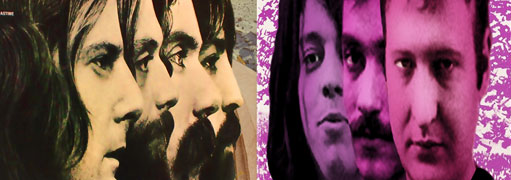I’m a sucker for cover songs. Whether the aural darlings’ intention is straight-up homage or radical reinterpretation, the resulting compositions are often a thrill. Some folks consider anything other than the original composer or performer’s intention sacrilege. I don’t subscribe to that philosophy, natch, so pardon me while I wax on about covers. The very fabric of American folk music, country and R&B is shot through with the mercurial threads of redux. On back porches, at community gatherings and in dance halls across America, individual interpretations of folk songs were plucked out of obscurity. A toe-tapping onlooker, having heard one version, would later extract some nuanced or vibrant essential aspect of the tune’s lyricism and rhythm—birthing yet another variation. That’s the original cover song. With the advent and adoption of copyright, ASCAP and so on, the purpose—and some might argue intent—of the cover song became more closely aligned with capitalizing on compositions’ recognition value and resulting profitability. While early American country and R&B artists and songwriters were profiting from covers, the studio system, the recording industry and digital rights management technology radically expanded the possibility for lucrative covers. As America—and the globe in toto—transitions away from the studio system and the star model, have covers recouped some of their tender cultural value? Everyone’s answer may differ, but one thing’s for sure: Covers are still all the rage. One of the first, oft-covered classic American songs that caught my youthful ear was “Stagger Lee.” The murder ballad’s rise to mainstream prominence started with Lloyd Price, who recorded a powerful rendition in 1959. When American Bandstand host Dick Clark deemed the song too morbid for the apple pie-munching citizenry, Price acquiesced, recording a stripped-down version of the song; a gambling feud morphs into an argument about a woman, and a brutal murder transmogrifies into a heated debate. Clark must have been surprised when the original, morbid version captured the imagination of the nation, and the sterile, bowdlerized track he suggested sank like a stone. Folklorist and archivist John Lomax first published “Stack O’Lee” in 1911. Its first recording was captured in 1923 by Fred Waring’s Pennsylvanians. Aside from Price’s striking, late-’50s version, the song has been covered by a myriad of artists. Its cover artists range from Woody Guthrie to Pacific Gas & Electric (included on Quentin Tarantino’s Death Proof soundtrack) to Dr. John to Mary Wells to The Black Keys and betwixt and between. Standouts include Ma Rainey’s blues-moaner “Stack O’Lee Blues,” Nick Cave & the Bad Seeds’ homoerotic and profanity-laced take, Furry Lewis’ soulful rendition of “Billy Lyons & Stack O’Lee” and Jamaican rocksteady act The Rulers’ antihero paean “Wrong ’em, Boyo” (notably covered by The Clash). When psychedelic folk-rock quintet The Byrds released the single “Eight Miles High” in 1966, the American landscape was at the apex of a suburban seachange. The civil rights movement and urban desegregation-spurred white flight, the post-war economic boom and the derailing of public transit in favor of solo travel on the great American highway—see Eisenhower-era Federal Aid Highway Act of 1956—congealed into modern U.S. suburbia. This Byrds’ tune captures a sense of hyperreal isolation. At the height of the Reagan years, alt.rock/punk trio Hüsker Dü massaged the message with thrashing melody on a 1984 single. If forced to choose an all-time favorite cover, that’s it, and—while I can prattle on about most covers—that one defies description. When something grabs you like that, it’s natural to be dumbstruck.Covers that capture the essence of a song while expanding its genre categorization are my bread-and-butter. Recently (and not-so-recently) discovered examples include: Frank Chickens’ “Fujiyama Mama” (Wanda Jackson), //TENSE//’s “The Chain” (Fleetwood Mac), Butterclock and oOoOO’s “Hustling” (Rick Ross), Soap&Skin’s “Janitor of Lunacy” (Nico), Chromatics’ “Into the Black” (Neil Young), Velocity Star’s “Warm Leatherette” (The Normal), Zombelle’s “Pumpkin Pumpkin” (Kreayshawn), Oneohtrix Point Never’s “I Only Have Eyes for You” (The Flamingos), Petra Haden’s “Psycho Main Title” (Bernard Hermann), Bongwater’s “Kisses Sweeter Than Wine” (Lead Belly/The Weavers), Jared Louche and the Aliens’ “In Every Dream Home a Heartache” (Roxy Music) and Klaus Nomi’s “Lightning Strikes” (Lou Christie).










